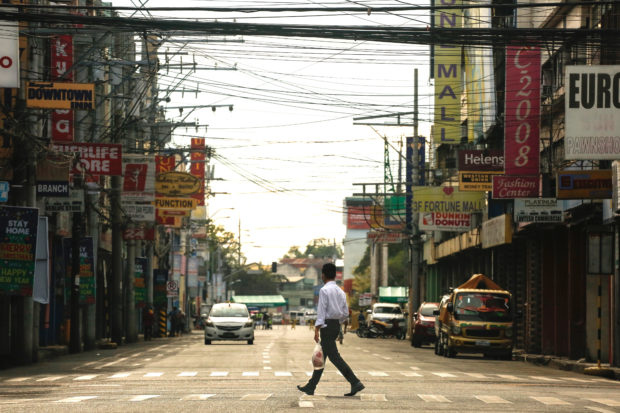
QUIET STREET After Davao City reverted to general community quarantine in November 2020, major streets like the usually crowded San Pedro Street become deserted as residents are prevented from leaving their homes on Sundays. Mayor Sara Duterte extended the curfew and liquor ban in the city up to end of January 2021. —KARLOS MANLUPIG
DAVAO CITY, Davao del Sur, Philippines — Amid a new hope offered by vaccines to fight the coronavirus disease, Mayor Sara Duterte urged the public not to let their guard down as she extended the implementation of alternative work arrangement in city offices and factories up to June and the liquor ban and curfew hours up to the end of January.
“It does not mean that because this is a New Year, the COVID-19 (pandemic) is over. COVID-19 is still around, so we continue our COVID-19 response,” Duterte said in a New Year’s Day message over the Davao City Disaster Radio.
She issued Executive Order No. 70 on New Year’s Eve, which extended for another six months Executive Order No. 56, which calls for the adoption of alternative work arrangements in public and private workplaces to help curb the spread of the virus in the city.
EO 56, issued on Oct. 26 last year, was supposed to lapse on Dec. 31, 2020.
“It becomes necessary to extend Executive Order No. 56 s. 2020 to prevent close contact [among] employees [who will be reporting for work] and to decongest public utility vehicles of passengers and lessen the risk of transmission,” Duterte said.
Projected surge
Earlier, the mayor said the city expected a surge of COVID-19 cases in the first month of the year as some people held parties and gatherings to celebrate the holidays despite stern government warnings to limit these events to household members only.
The new executive order cited the need to control the number of infections because of the full occupancy of beds for patients in Southern Philippines Medical Center and the temporary treatment and monitoring facilities.
Alternative work schemes include maintaining skeletal workforce in offices and factories, work-from-home arrangement, and the adoption of staggered work hours among employees.
Health authorities has traced clusters of COVID-19 cases from work areas to households after the reopening of businesses last year.
Duterte warned government employees that the alternative work hours could not be used as reason for delayed public service. “The hours at home will be counted as worked hours, provided that they can deliver their tasks correct and complete,” she said.
The mayor issued another order extending the 9 p.m. to 4 a.m. curfew hours and the 24-hour liquor ban in the city up to the end of this month.
Extended GCQ
She reintroduced the curfew hours after the city reverted to general community quarantine (GCQ) status on Nov. 20, 2020 due to the continued rise in COVID-19 cases. The GCQ has been extended up to the end of this month.
Duterte reimposed the liquor ban following a spike in virus cases that had threatened to overwhelm the region’s health centers and alarmed medical practitioners.
She reminded restaurants, sari-sari stores and similar establishments of the standing “one-strike rule,” which meant that their establishments could face immediate closure once caught violating the liquor ban.